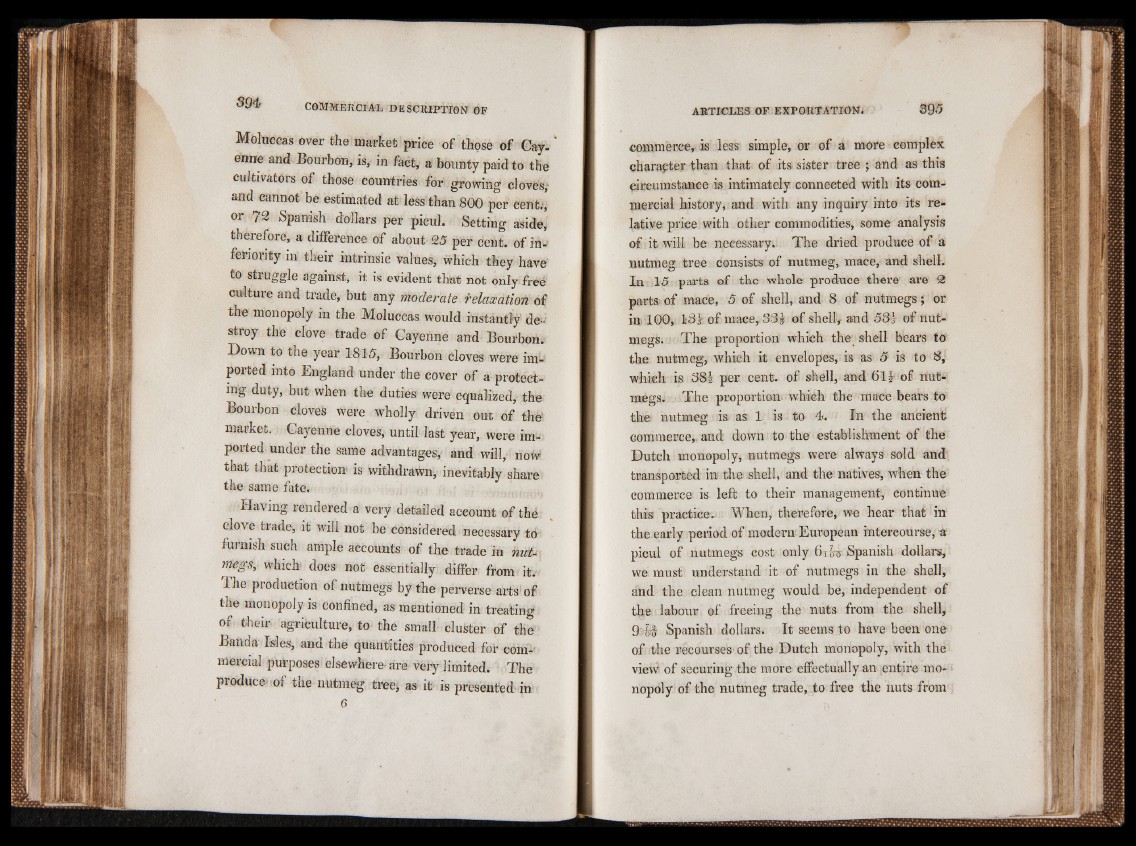
Moluccas over the market price of those of Cay-
enne and Bourbon, is, in fact, a bounty paid to the
cultivators of those countries for growing cloves;
and cannot be estimated at less than 800 per eent.,
or 7 2 Spanish dollars per picul. Setting aside,
therefore, a difference of about 25 per cent, of inferiority
m their intrinsic values, which they hâve
to struggle against, it is evident that not only free
culture and trade, but any moderate Relaxation of
the monopoly in the Moluccas would instantly destroy
the clove trade of Cayenne and Bourbon.
Down to the year 1815, Bourbon cloves were irnt
ported into England under the cover of a protecting
duty, but when the duties were equalized, the
Bourbon cloves Were wholly driven out of the
market. Cayenne cloves, until last year, were imported
under the same advantages; and will, now
that that protection is withdrawn^ inevitably share
the same fate.
Having rendered a very detailed account of thé
clove trade, it will not be considered necessary to
furnish such ample accounts of the trade in nwt^
megs, which does not essentially differ from it.-
The production of nutmegs by the perverse arts! of
the monopoly is confined, as mentioned in treating
of their agriculture, to the small cluster of the
Banda Isles, and the quantities produced for commercial
purposes elsewhere are very limited. The
produce- of the nutmeg tree* as it is presented in
6
commerce, is less simple^ or of a more complex
character than that of its sister tree ; and as this
circumstance is intimately connected with its commercial
history, and with any inquiry into its relative
price with other commodities, some analysis
of it will be necessary. The dried produce of a
nutmeg tree consists of nutmeg, mace, and shell.
In 15 parts of the whole produce there are 2
parts of mace, 5 of shell, and 8 of nutmegs; or
in 100, of mace, 335 of shell, and 531 of nutmegs.
The proportion which the shell bears to
the nutmeg, which it envelopes, is as 5 is to 3,
which is 381 per cent, of shell, and 6 IT of nutmegs.
The proportion, which the mace bears to
the nutmeg is as 1. is to 4. In the ancient
commerce,, and down to the establishment of the
Dutch monopoly, nutmegs were always sold and
transported in the shell, and the natives, when the
commerce is left to their management, continue
this practice. When, therefore, we hear that in
the early period of modern European intercourse, a
picul of nutmegs cost only 6 ik Spanish dollars,
we must understand it of nutmegs in the shell,
and the clean nutmeg would be, independent of
the labour of freeing the nuts from the shell,
9' $| Spanish dollars. It seems to have been one
of the recourses of the Dutch monopoly, with the
vieW of securing the more effectually an entire monopoly
of the nutmeg trade, to free the nuts from